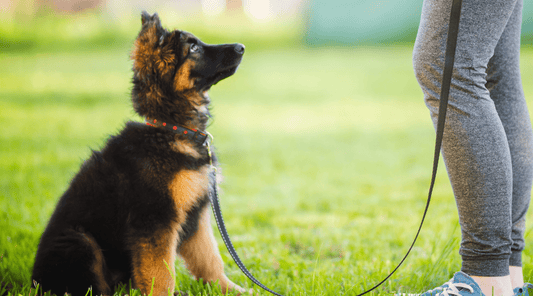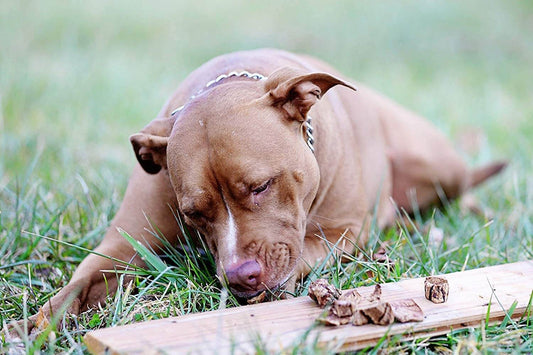
Do Natural Bones Hurt My Dog’s Mouth? When Helpful Turns to Harm
Dawn Miller Nov 07, 20245 Minute ReadOn a crisp Autumn evening, my partner and I enjoyed a walking tour through the historic district in town with our 3 dogs leading the way. It's astounding how well they preserved the look and feel of this area, which dates back to the late 1930s, while still ensuring residents have access to all of the modern conveniences we enjoy. From 300-year-old maples to mid-century retaining walls, it's a lot to take in.
They have withstood the test of time like natural bones can stand up to even the most aggressive chewing. But does that durability come at a price of my dogs' mouths—their teeth? Should I be looking for a softer alternative? Or is the marrow bone just misunderstood?
Do Natural Bones Hurt My Dog’s Mouth?
Natural bones can be safe for frequent chew time. But they can also hurt your dog's mouth. For example, if the bone is splintered with sharp edges, these could cut the gums and digestive tract if they swallow that jagged piece.
Natural bones could also cause pain if a dog can chew on their bone without restrictions. Some dogs will chew endlessly and obsessively, trying to get that bone marrow out. But the thing about marrow is that it's rich, nutritious, and filling. They really shouldn't be trying to eat that much in one sitting.
Then, there are senior dogs who already have decaying teeth and gums. On the one hand, it may feel good for them to chew as it can stimulate dopamine, which lessens pain. The best chew bones for dogs can massage infected gums. But on the other hand, it could hurt them, causing already loose teeth to fall out.
Finally, a teething puppy might like having a bone to chew on to relieve teething pain. But if they don't have their adult teeth yet, they may break their baby teeth on the natural bone when they need to learn to eat solid food.
So, when selected carefully and given appropriately, bones are unlikely to cause mouth discomfort. You can manage the risks of jagged edges or obsessive chewing that could lead to cuts or discomfort.
Natural Bones a Net Positive For Dog Mouth Health
Dog bones also serve several functions in preventing mouth pain and declining dental health that cannot be denied. So, it's important to step back and look at the big picture.
60-80% Less Harmful Bacteria
First of all, studies show that dogs who regularly chew on bones have fewer bacteria in their mouths, and not just a little—it's 60-80%. When mouths have a lot of harmful bacteria, those critters produce a more acidic mouth ecosystem. This acid is constantly attacking the teeth, wearing away at them until they begin developing cavities and then falling out.
These harmful bacteria embed themselves under the gumline, leading to red, swollen gums that will begin to recede, leading to tooth loss.
Now, I don't want to make this sound trivial. But these bacteria are also what makes some dogs have terrible breath. When we adopted our terrier Pixie from the local shelter, she was only around two years old and already had some nasty breath. It took a couple of months of chewing on dog bones for her to get her bacteria count down.
By the time I got to take her to her first dental cleaning about 3 months in, the dog dentist was raving about how clean her teeth were. I would buy dog bones just for that, but of course, there are more ways natural chew bones reduce mouth pain.
Less Bacteria Harboring Plaque
One of the reasons the bacteria count is so much lower is that the act of chewing on bones scrapes plaque off of teeth. And it massages the gums so they release that bacteria and start to heal.
Better Saliva Production
Gnawing on natural bones also increases saliva production, which helps to wash away some of the bacteria and restore the mouth's pH.
Stronger Jaw
It's easy to forget that the jaw is an important part of mouth health and that jaw pain can make it hard to eat. The good news is that natural bones also act as jaw strengtheners. Again, chewing reinforces the bone and joint tissues, making them stronger.
Bone and Joint Promoting Nutrients
Now, this is where natural bones really set themselves apart from fake bones like those made of rawhide, plastic, rubber, or wood pulp. Real marrow bones for dogs actually have a lot of nutrition that dogs may not get if they only eat kibble. These include:
- Collagen. A structural protein, collagen is the foundation of healthy bones, joints, skin, and teeth. As dogs age, they struggle to produce enough collagen. So, supplementing from a young age is a great idea,
- Glucosamine / Chondroitin. These key nutrients found in joint supplements have been well studied for their joint pain reduction and joint health support properties.
- Calcium / Magnesium. These aren't the only minerals in natural bones, but I'll mention them specifically because they are important for not only bone health but also proper muscle function.
- Omega 3. This essential healthy fat is known for its anti-inflammatory properties.
And when the marrow is gone, did you know you can refill the bone with dog-approved treats like peanut butter to encourage healthy chewing? Get tips and recipes in my free dog bone refill guide.
Tips for Avoiding Dog Mouth Pain from Bones
Safe use of dog chew bones requires some basic precautions.
- Watch for Signs of Mouth Pain. If you notice flinching, strange mouth noises, chewing on one side, or reduced appetite, please take your baby to the dog doctor.
- Limit Chewing Time. Try to keep sessions around 15-20 minutes. Extended chewing can lead to gum and tooth soreness. And it's more than a dog needs to get the full benefits of marrow bones for dogs.
- Wait for Adult Teeth. Puppies should have a full set of adult teeth, usually around 6 months.
- Try Softer Chews for Seniors and Older Puppies. Senior dogs may benefit from a softer chew like beef trachea. I call these my dog's glucosamine chondroitin supplements and their natural toothbrush. They're mostly cartilage, which is more pliable for teeth, gums, and jaws that may already be sore because of age or dental health. Beef trachea is also a great way to introduce natural dog chew bones to your puppy.
- Take Dangerous Bones Away. If a bone breaks, it's time to take it away from your dog to prevent cuts in the mouth and digestive tract.
- Make Sure They're Prepared Correctly. Raw bones can be too hard. Dairy cow bones or any dinner bone will be too soft. Dog bones should be prepared carefully using a low-heat, slow-cooked process to produce the safest bone density.
- Regular Dental Check-Ups. Routine vet check-ups help spot any dental issues early, ensuring your dog’s mouth stays healthy and pain-free.
The Best Chew Bones for Dogs
If you're looking for the best chew bones, you'll want to try grass-fed beef marrow bones. They're loaded with nutrition and the right density for mouth health.Available On:





